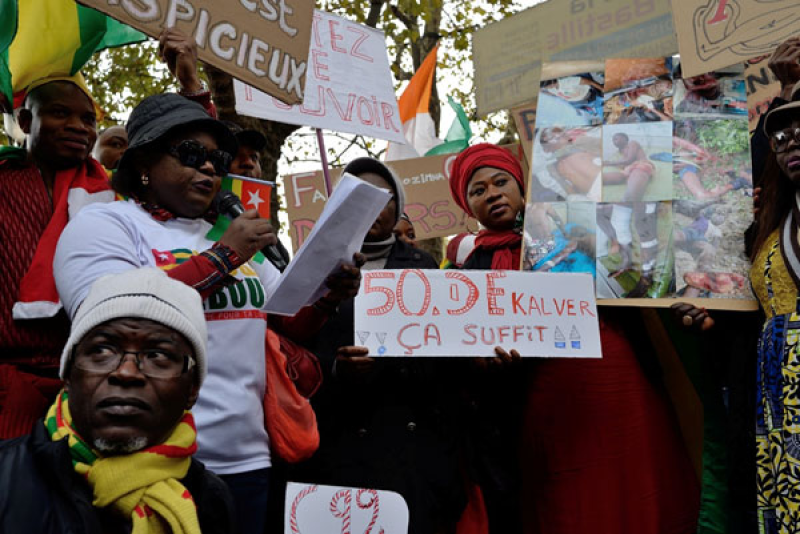- Xi unveils vision for equitable global governance, rejects unilateralism |
- EU Warns Xi-Putin-Kim Alliance a Challenge to World Order |
- Matarbari Project Set to Create 2.5m Jobs, Boost Economy |
- 4,000 ASIs to Be Recruited Ahead of Polls, Says IGP |
- World Heritage Sites Face Rising Water Risks from Climate Change |
Togo’s Youth Rise Against Six Decades of Gnassingbé Rule

Credit: Pascal.Van
In late June, thousands of protesters filled the streets of Lomé, Togo’s capital, presenting the ruling dynasty with its biggest challenge in decades.
The catalyst was constitutional manoeuvring by President Faure Gnassingbé to maintain his grip on power. In March 2024, his government pushed through constitutional amendments transforming Togo from a presidential to a parliamentary system. This created a new position, the President of the Council of Ministers—effectively Togo’s chief executive—elected by parliament rather than by popular vote and with no term limits. Gnassingbé assumed this role in May, making it clear the changes were intended to keep him in power indefinitely.
This manoeuvre was the latest episode in a 58-year family saga that began when Faure’s father, Gnassingbé Eyadéma, seized power in a 1967 coup. For 25 years, Eyadéma ruled over a one-party state, staging elections that reached absurd heights in 1986 when he claimed re-election with nearly 100% of votes on a 99% turnout. Even after nominal multiparty democracy arrived in 1992, elections remained charades, with opposition parties facing systematic obstacles that made fair competition impossible.
When Eyadéma died in 2005, the military appointed his son Faure as successor, despite the constitution mandating immediate elections. International pressure forced a hastily organised vote, but the familiar script of violence, fraud, and repression persisted. This pattern repeated in 2010, 2015, and 2020, offering a veneer of legitimacy for continued authoritarian rule and provoking waves of protests that were violently suppressed.
Now, two decades after Faure took power, this latest constitutional gambit has triggered the most significant challenge to his rule. The amendments designed to entrench him have instead galvanized opposition, particularly among young people who have never known any leaders other than the Gnassingbés. Raised on promises of multiparty democracy, they link their daily struggles—unemployment, power outages, crumbling infrastructure—to long-term denial of democratic freedoms.
The arrest in May of popular rapper and TikToker Aamron, for posting a video calling for street protests to coincide with Gnassingbé’s birthday on 6 June, turned simmering frustration into organised resistance. Aamron’s detention led to the formation of the 6 June Movement (M66), led by young artists, bloggers, diaspora-based activists, and civil society figures, relying heavily on social media to coordinate protests and bypass state-controlled channels.
The government responded with a familiar authoritarian crackdown. In late June, security forces killed at least seven people, including 15-year-old Jacques Koami Koutoglo, while using teargas, beatings, and mass arrests against protesters. Journalists were detained, protest footage deleted, and internet shutdowns imposed. International media outlets such as France 24 and RFI were suspended, and international arrest warrants were issued for M66 leaders abroad, accused of terrorism and subversion.
Despite repression, protests continue. Youth leadership, less intimidated by security forces and better connected through social media, has diversified opposition tactics, shifting between street protests, legal challenges, and international advocacy. Togolese diaspora communities are also organising solidarity actions and lobbying international bodies for sanctions against the regime.
Significant obstacles remain. Gnassingbé controls all levers of power, including security forces, the electoral commission, and the Constitutional Court. Democratic transition would require intensified international pressure, targeted sanctions, and regional intervention, particularly from the Economic Community of West African States (ECOWAS).
Whether these protests trigger democratic change or become another chapter of repressed dissent depends on the pro-democracy movement’s ability to sustain pressure and whether the international community acts decisively. Gnassingbé’s constitutional manoeuvre may prove his final act—not because it preserved his power, but because it awakened a new generation. Togo’s youth have discovered the power of collective action, which could prove decisive.
Inés M. Pousadela is CIVICUS Senior Research Specialist, co-director and writer for CIVICUS Lens, and co-author of the State of Civil Society Report.

